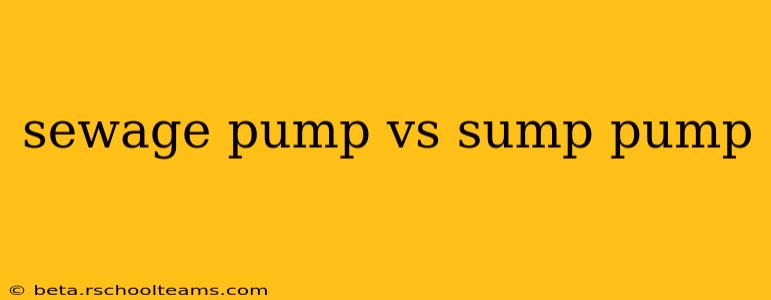Choosing between a sewage pump and a sump pump can be confusing, as both handle wastewater. However, they serve distinct purposes and have different capabilities. This comprehensive guide will clarify the key differences, helping you choose the right pump for your needs.
What is a Sewage Pump?
A sewage pump is designed to handle raw sewage, a mixture of human waste, toilet paper, and other organic materials. These pumps are robust and built to withstand the harsh conditions of handling solids and potentially corrosive waste. They're typically used for:
- Wastewater disposal from homes and businesses: This includes handling effluent from toilets, showers, sinks, and other plumbing fixtures.
- Septic systems: Sewage pumps are crucial components in many septic systems, moving wastewater from the tank to a drain field.
- Industrial applications: Industries often employ sewage pumps for handling wastewater generated during various processes.
Sewage pumps are characterized by their powerful motors and ability to handle large solids. They often include cutting mechanisms to prevent blockages.
What is a Sump Pump?
A sump pump is designed to remove water that accumulates in a sump pit, a low-lying area in a basement or crawlspace. This water typically results from groundwater seepage, heavy rains, or plumbing leaks. Unlike sewage pumps, sump pumps primarily handle relatively clean water, although they can handle small amounts of sediment. They're commonly used for:
- Basement waterproofing: Preventing flooding in basements and crawlspaces by removing accumulated water.
- Foundation drainage: Protecting the foundation of a building from water damage.
- Emergency drainage: Handling unexpected water accumulation due to storms or plumbing failures.
Sump pumps are generally smaller and less powerful than sewage pumps, focusing on efficiently moving relatively clear water.
Sewage Pump vs. Sump Pump: Key Differences Summarized
| Feature | Sewage Pump | Sump Pump |
|---|---|---|
| Waste Type | Raw sewage (solids and liquids) | Relatively clean water (minor sediment OK) |
| Capacity | High capacity, handles large solids | Lower capacity, handles minimal solids |
| Motor Power | Powerful motor | Less powerful motor |
| Construction | Robust, corrosion-resistant materials | Usually less rugged materials |
| Typical Use | Wastewater disposal, septic systems | Basement waterproofing, foundation drainage |
| Cost | Generally more expensive | Generally less expensive |
What are the Different Types of Sewage Pumps?
Several types of sewage pumps cater to diverse applications. These include:
- Submersible sewage pumps: These pumps are submerged directly in the wastewater, ideal for deep pits or tanks.
- Non-submersible sewage pumps: These pumps sit above the wastewater level, requiring a suction pipe.
- Macerating sewage pumps: These pumps grind up solids before pumping them, preventing blockages.
What are the Different Types of Sump Pumps?
Sump pumps also come in various types:
- Pedestal sump pumps: These pumps sit on top of the sump pit, with the pump itself above water level.
- Submersible sump pumps: These pumps sit directly within the sump pit, submerged in the water.
- Battery backup sump pumps: These pumps offer protection during power outages, crucial for preventing basement flooding.
How Do I Choose the Right Pump?
The choice between a sewage pump and a sump pump depends entirely on your needs. If you need to handle raw sewage, a sewage pump is essential. If you only need to remove relatively clean water from a sump pit, a sump pump will suffice. Consider consulting a plumber or drainage specialist for advice on the appropriate pump for your specific situation.
Can a Sump Pump Handle Sewage?
No, a sump pump is not designed to handle sewage. Attempting to pump sewage with a sump pump will likely damage the pump and create a messy, unsanitary situation. Sewage contains solids and potentially corrosive materials that can quickly overwhelm and break down a sump pump.
Can a Sewage Pump Handle Clean Water?
While a sewage pump can handle clean water, it's overkill and inefficient. Using a sewage pump for clean water applications is like using a sledgehammer to crack a nut. A sump pump is a far more economical and efficient solution for clean water removal.
This guide provides a comprehensive overview of sewage pumps and sump pumps, highlighting their key differences and applications. Remember, choosing the correct pump is crucial for effective wastewater management and preventing costly damage.
